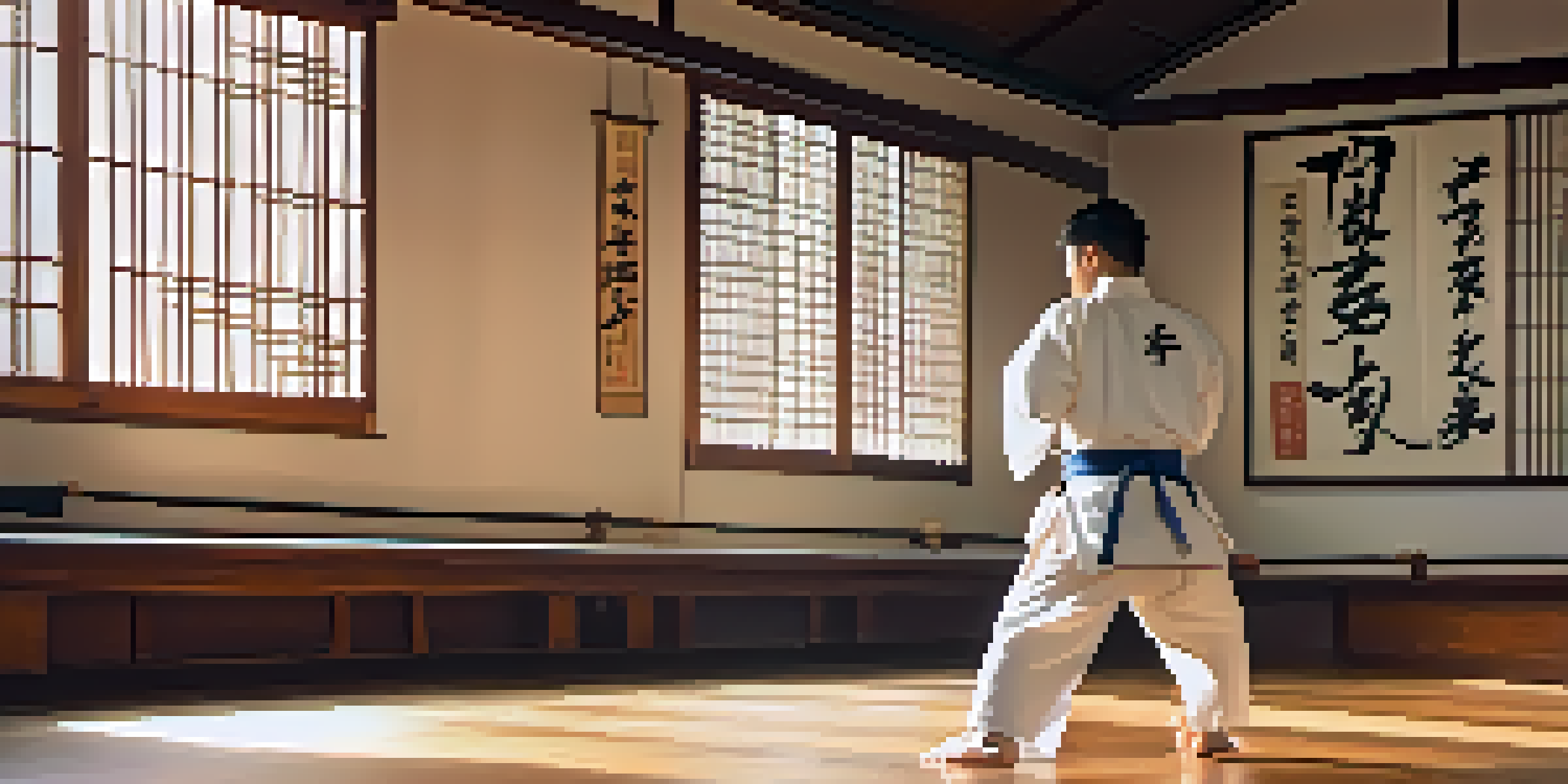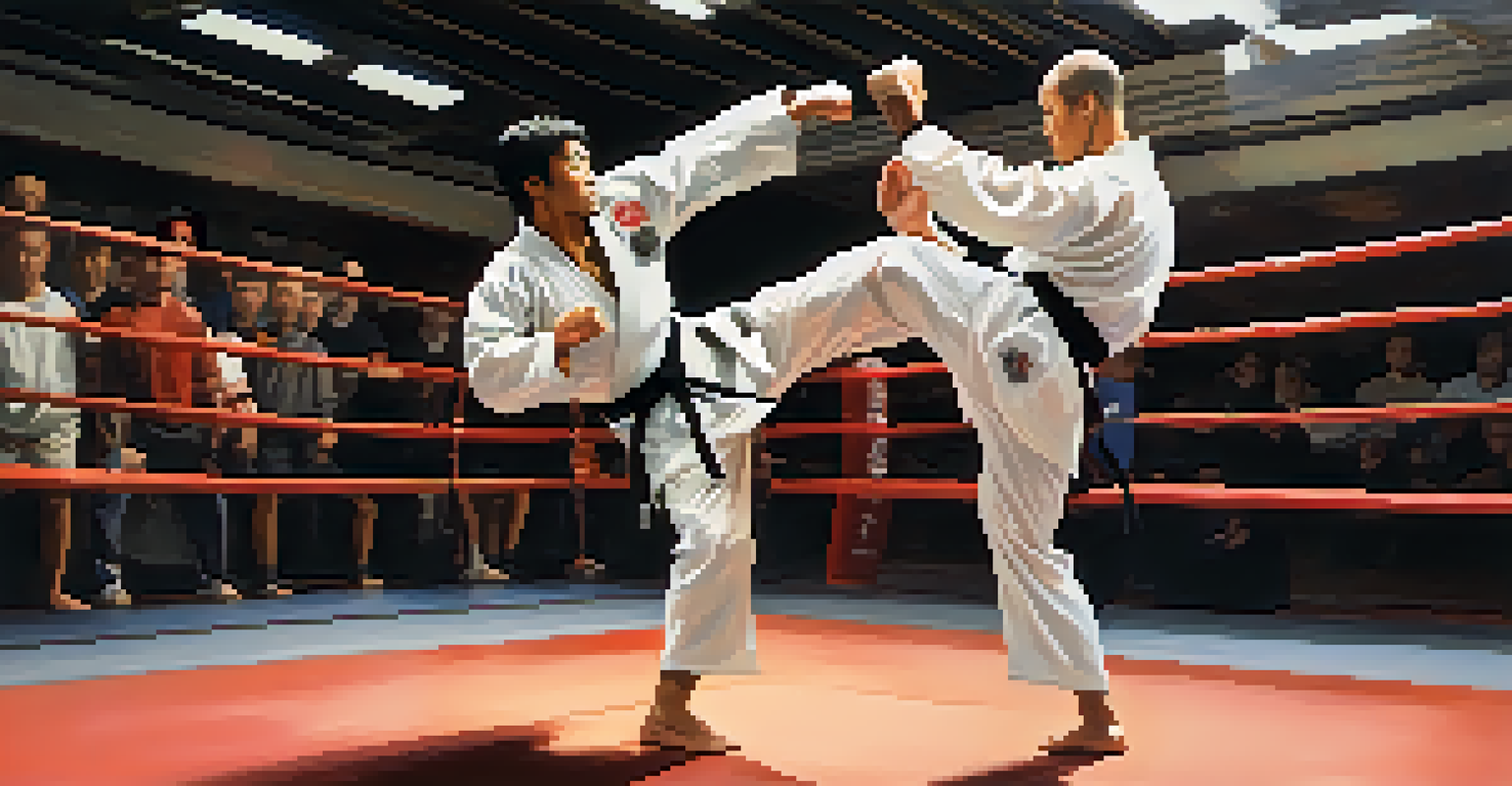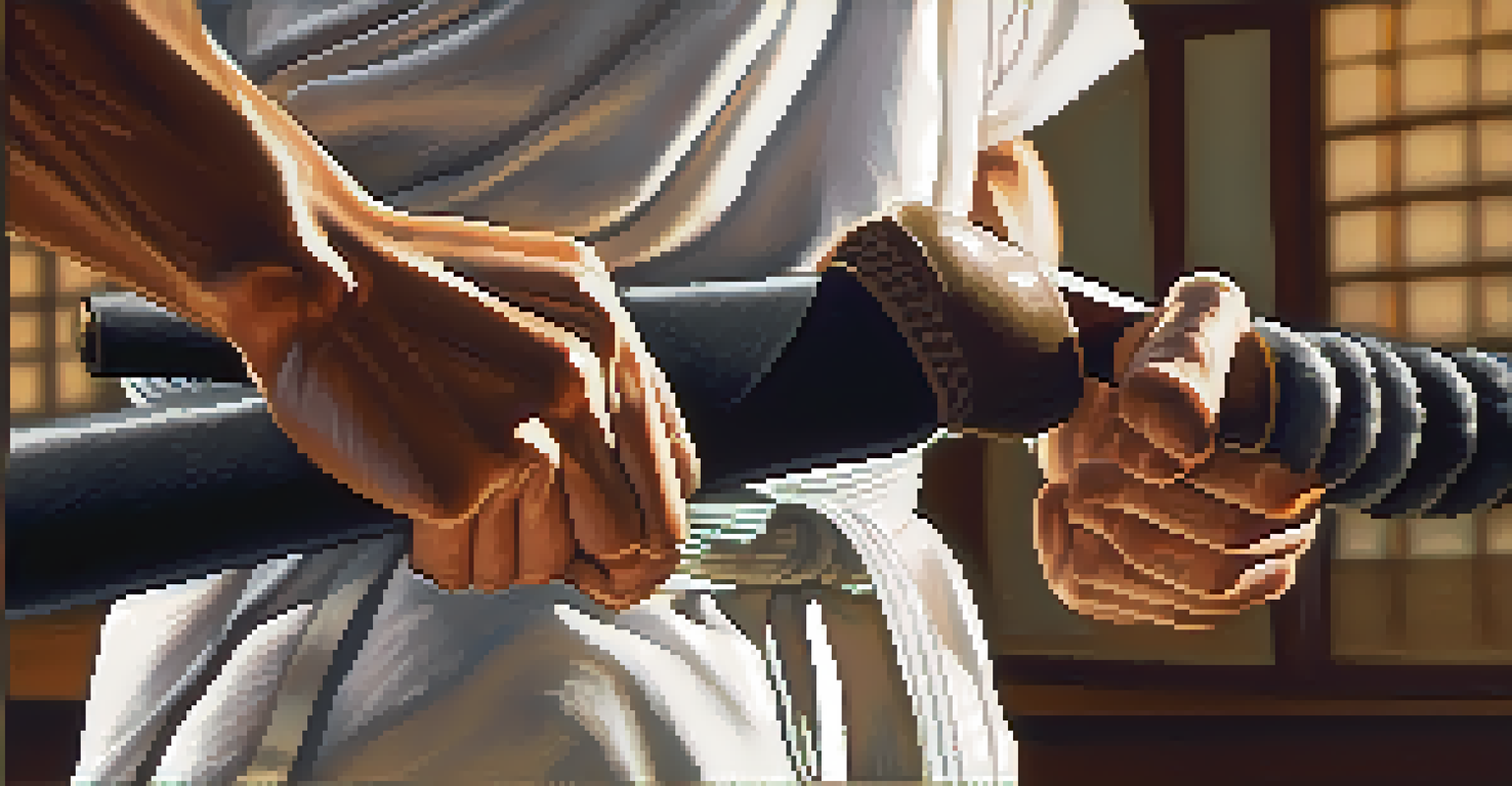Emotional Resilience: Lessons Learned from Martial Arts

Understanding Emotional Resilience in Martial Arts
Emotional resilience refers to the ability to adapt to stress and adversity. In martial arts, practitioners face various challenges, both physical and mental, that test their limits. This training environment cultivates a mindset geared towards overcoming obstacles, which is a crucial aspect of emotional resilience. Essentially, martial arts teach us not just how to fight, but how to bounce back from setbacks.
It's not whether you get knocked down, it's whether you get up.
For instance, consider a martial artist who faces defeat in competition. Instead of giving up, they analyze their performance, learn from their mistakes, and prepare to return stronger. This process mirrors life’s challenges, where resilience is often about learning and evolving through difficulties. By embracing this learning mindset, martial artists embody the spirit of resilience.
Moreover, the discipline required in martial arts extends beyond the dojo. It encourages individuals to maintain focus and determination in everyday life. This kind of mental fortitude fosters a sense of emotional stability, allowing practitioners to handle stress more effectively in various situations.
Building Confidence Through Training
One of the most significant benefits of martial arts is the boost in self-confidence it provides. As students progress through skills and techniques, they experience a sense of achievement that enhances their self-esteem. This newfound confidence can spill over into other areas of life, helping individuals tackle challenges with a more positive outlook.

Take, for example, a beginner who struggles with basic techniques. Over time, with practice and perseverance, they master these skills and begin to feel a sense of pride in their progress. This journey of growth not only builds confidence but also reinforces the idea that resilience is about persistence. The more we practice, the more adept we become at facing obstacles.
Emotional Resilience Through Training
Martial arts cultivate emotional resilience by teaching practitioners to adapt to challenges and learn from setbacks.
Additionally, martial arts often involve sparring and competition, which can be intimidating. However, facing these fears head-on teaches individuals to remain calm and composed under pressure. This ability to manage anxiety contributes to overall emotional resilience, equipping practitioners with tools to navigate life's unpredictable moments.
The Power of Community in Martial Arts
Martial arts are often practiced in a communal setting, fostering a sense of belonging and support among practitioners. This supportive environment plays a crucial role in developing emotional resilience. Knowing that others are there to encourage and challenge you can make a significant difference when facing personal struggles.
The only way to make sense out of change is to plunge into it, move with it, and join the dance.
For instance, during training sessions, students often partner up to practice techniques. This collaboration not only builds camaraderie but also helps individuals learn from each other’s experiences. Sharing challenges and triumphs creates a strong bond, reinforcing the idea that we are not alone in our struggles.
Moreover, martial arts schools often celebrate achievements, big or small, which further strengthens community ties. When we uplift one another, we collectively build resilience, as we learn that it’s okay to lean on others during tough times. This interconnectedness is a vital element of emotional health, reminding us that support systems are essential.
Mindfulness and Focus in Martial Arts Practice
Martial arts training emphasizes the importance of mindfulness and focus, which are key components of emotional resilience. Practitioners learn to be present in the moment, honing their concentration on techniques and movements. This level of focus can help quiet the noise of daily life, providing a mental reset.
For example, during a kata (a form or pattern of movements), martial artists must concentrate fully on their execution. This practice of mindfulness not only enhances performance but also serves as an emotional anchor. By focusing on the present, practitioners learn to manage stress and anxiety more effectively.
Confidence Boost from Achievements
Progress in martial arts enhances self-confidence, enabling individuals to tackle life's challenges with a positive outlook.
Furthermore, the discipline of maintaining focus during training can translate to everyday situations. When faced with stressors, individuals who practice mindfulness can better regulate their emotions and reactions. This skill is invaluable, allowing them to approach challenges with a calm and clear mindset.
Adapting to Change Through Martial Arts
Martial arts often require practitioners to adapt quickly to new techniques and challenges. This constant need for adaptation fosters a mindset that embraces change rather than shying away from it. Learning to adjust strategies in the dojo translates into a greater ability to handle life's unpredictability.
Consider a scenario where a martial artist faces a new opponent with a different fighting style. They must quickly analyze and adapt their approach to succeed. This experience teaches valuable lessons about flexibility and the importance of being open to new perspectives. Such adaptability is a hallmark of emotional resilience.
In everyday life, embracing change can lead to personal growth and greater emotional strength. When we learn to navigate the ups and downs with grace, we become more resilient individuals. Martial arts provide a safe space to practice this adaptability, equipping us with skills that serve us well outside the dojo.
Discipline and Commitment as Resilience Builders
Discipline is a cornerstone of martial arts training, requiring consistent practice and commitment. This dedication not only enhances physical skills but also strengthens emotional resilience. By committing to their training, practitioners learn the value of perseverance in the face of challenges.
For instance, a martial artist may commit to attending classes regularly, even when motivation wanes. This discipline teaches them that resilience is often about showing up, even when it’s hard. The act of pushing through difficulties builds character and reinforces the idea that growth comes from effort.
Community Support Strengthens Resilience
The supportive environment in martial arts fosters a sense of belonging, helping individuals build resilience through shared experiences.
Additionally, the structured nature of martial arts training instills a sense of routine. This predictability can be comforting in a fast-paced world, providing a foundation upon which practitioners can build their emotional strength. The discipline learned in martial arts can help individuals remain steadfast in their goals, despite the inevitable hurdles they may encounter.
Lessons from Martial Arts for Everyday Life
The lessons learned from martial arts extend far beyond the dojo and into our everyday lives. The principles of resilience, confidence, and adaptability can be applied to various situations we face daily. By integrating these lessons, we can navigate personal and professional challenges more effectively.
For instance, when faced with a tough project at work, one can draw on the discipline and focus learned in martial arts training. Approaching the task with a clear mind and a resilient attitude can significantly improve outcomes. This mindset shift can help transform obstacles into opportunities for growth.

Ultimately, the journey of emotional resilience is ongoing, and martial arts provide a valuable framework for personal development. By embracing the lessons learned through training, individuals can cultivate a more resilient approach to life, empowering them to face whatever comes their way with confidence and determination.